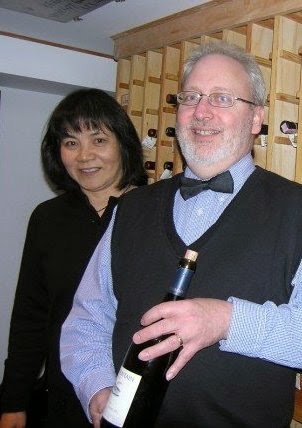How I find the perfect
gift wine for my customers
In the movie Red Obsession,
a winemaker from Bordeaux says, “We need to please our customers,
not impress them.” Great advice for anyone in our industry. In the
case of a gift-wine, however, the challenge is doubled, because we
need to please both the giver and their recipient.
When my customers ask for a
gift wine I immediately create a mental flowchart. I play twenty
questions with them, but in a nice, chatty way that does not
(hopefully) feel like an interrogation.
Who is the recipient?
What I need to know is the
relationship with the gift-giver - boss or superior, colleague,
love-partner, love-partner wanna-be, friend, close friend, neighbour,
hostess-gift, etc
What are the recipients
tastes in wine? How knowledgeable are they about wine?
Sometime the giver knows
nothing about the recipient. For example they are shopping for a
secret Santa or they want a case of wine and gift bags on hand for
unexpected people. In that situation I suggest wines based on the
giver's taste. After all they may end up drinking it.
What is the occasion?
Under the tree? Company
party? One on one? Why this is important is because the more generic,
anonymous the occasion, the more generic, anonymous the gift. You
don't need to learn some interesting story about the winemaker's
wartime experience if the recipient will never know. At the same
time, if the occasion is a Chanukah party, you might want to find an
interesting Israeli wine.
Price, budget?
I always try to come in a
bit below the customer's budget. Make them pleased. There is so much
great wine at all price levels that surely we can find a wonderful
gift for any budget.
Some general guidelines:
Red before white.
Unfortunately we all still believe that Red is somehow more wine. Of
course pick white if we know the recipient loves white. Sparkling can
also be a great choice.
New world over old. Again
unless we know otherwise, recipients will think they understand new
world. However if the giver says that the recipient just got back
from Greece, then go Greek!
Package – lots of great
wines come with ugly labels. Don't pick them. Name names, you insist?
Well, ok, Caronne Ste Gemme is a fantastic Bordeaux with a label your
ten-year-old niece could improve upon with a desktop publishing
program. Find wines with labels that are elegant and well-designed.
Stay away from critter wines, unless the giver knows the recipients
favourite is Little Penguin. Stay away from cute names,
“ZinfreekinFastic,” unless you know the recipient goes that way.
Famous brands - “They just
love Cakebread.” A smart move here is to find something similar but
obscure, better priced and will exceed all expectations. Unless the
recipient is a total brand-hog, you and the giver will be heroes.
In general stay
conservative, go with the tried and true. But if you know the
recipient is a bit open-minded and experimental you can find many
fantastic crowd-pleasing wines from, for example, Spain or Portugal,
for under $20.
